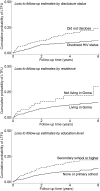Disclosure of HIV status and its impact on the loss in the follow-up of HIV-infected patients on potent anti-retroviral therapy programs in a (post-) conflict setting: A retrospective cohort study from Goma, Democratic Republic of Congo
- PMID: 28170410
- PMCID: PMC5295697
- DOI: 10.1371/journal.pone.0171407
Disclosure of HIV status and its impact on the loss in the follow-up of HIV-infected patients on potent anti-retroviral therapy programs in a (post-) conflict setting: A retrospective cohort study from Goma, Democratic Republic of Congo
Abstract
Background: The study aimed to identify the impact of non-disclosure of HIV status on the loss to follow-up (LTFU) of patients receiving anti-retroviral therapy.
Methodology: A historic cohort of HIV patients from 2 major hospitals in Goma, Democratic Republic of Congo was followed from 2004 to 2012. LTFU was defined as not taking an ART refill for a period of 3 months or longer since the last attendance, and had not yet been classified as 'dead' or 'transferred-out'. Kaplan-Meier plots were used to determine the probability of LTFU as a function of time as inclusive of the cohort. The log-rank test was used to compare survival curves based on determinants. Cox proportional hazard modeling was used to measure predictors of LTFU from the time of treatment induction until December 15th, 2012 (the end-point).
Results: The median follow-up time was 3.99 years (IQR = 2.33 to 5.59). Seventy percent of patients had shared their HIV status with others (95% CI: 66.3-73.1). The proportion of LTFU was 12% (95%CI: 9.6-14.4). Patients who did not share their HIV status (Adjusted HR 2.28, 95% CI 1.46-2.29), patients who did not live in the city of Goma (Adjusted HR 1.97, 95% CI 1.02-3.77), and those who attained secondary or higher education level (Adjusted HR 1.60, 95% CI 1.02-2.53) had a higher hazard of being LTFU.
Conclusion: This study shows the relationship between the non-disclosure HIV status and LTFU. Healthcare workers in similar settings should pay more attention to clients who have not disclosed their HIV status, and to those living far from health settings where they receive medication.
Conflict of interest statement
The authors have declared that no competing interests exist.
Figures
References
-
- http://www.unaids.org (Accessed 24 December 2015)
-
- Musumari PM, Mitchell DF., Teeranee T, Wouters E, Masako O, Kihara M. (2013) “If I have nothing to eat, I get angry and push the pills bottle away from me”: A qualitative study of patient determinants of adherence to anti-retroviral therapy in the Democratic Republic of Congo, AIDS Care: Psychological and Socio-medical Aspects of AIDS/HIV, - PubMed
-
- Tadesse K, and Fisaha H. (2014) Predictors of Loss to Follow Up of Patients Enrolled on Anti-retroviral Therapy: A Retrospective Cohort Study. J AIDS Clin Res 2014, 5:12
MeSH terms
LinkOut - more resources
Full Text Sources
Other Literature Sources
Medical



